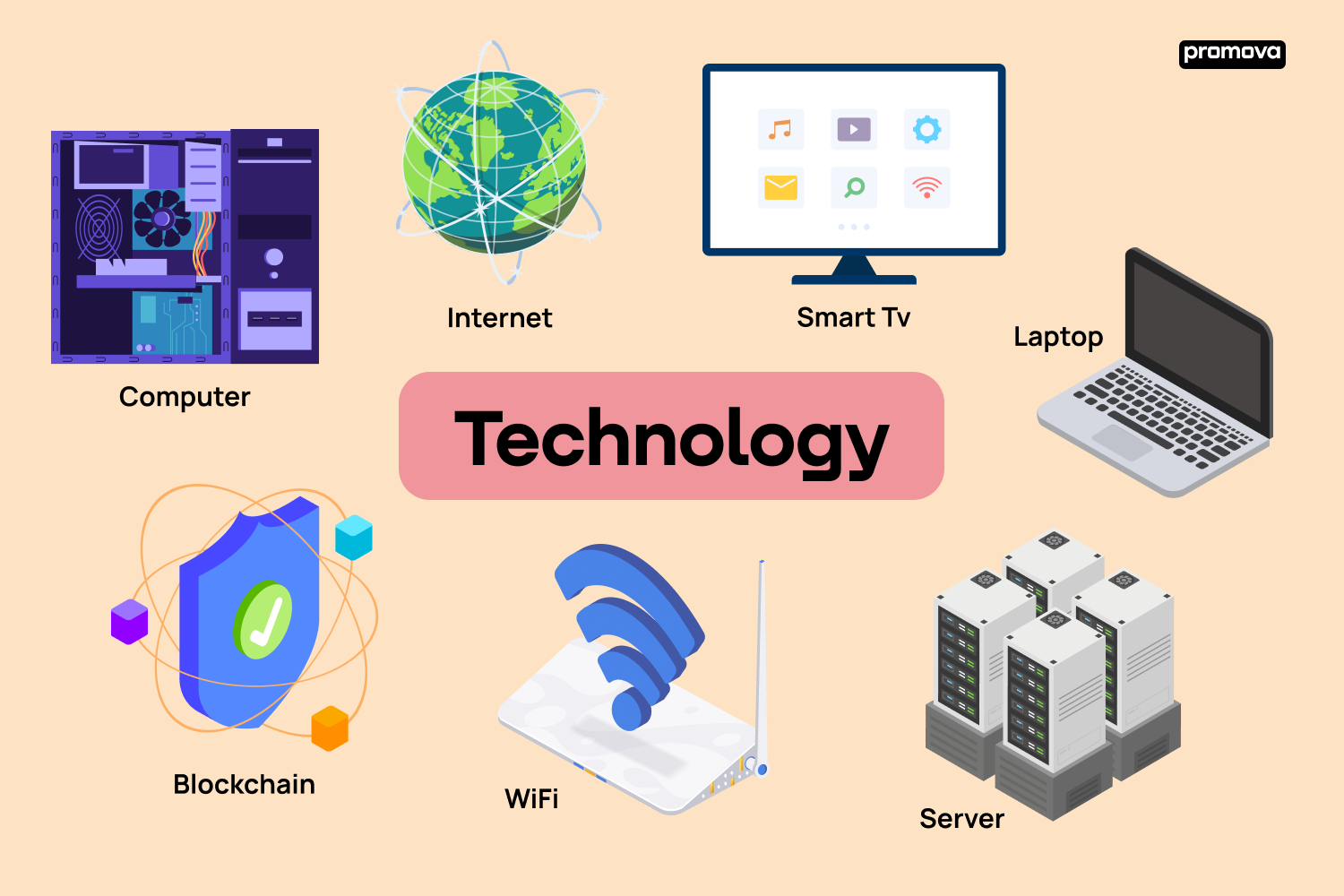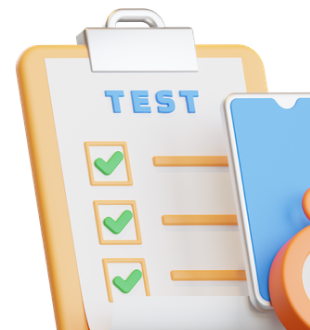Technology Vocabulary
Contents
Learning the language of technology can seem daunting, especially when new terms pop up almost daily. This article will guide you through some essential technological equipment and terms with their meanings, and provide context to help you understand and remember them.

Basics of Technology Vocabulary
Before diving into the deep end, let's start with some foundational technological vocabulary. These are examples of technological tools you might come across daily, and having a firm grasp on these will set you on the right path.
- Computer: a device that can be programmed to carry out arithmetic or logical operations.
- Internet: a worldwide network of computers and systems that can share and send information.
- Software: the programs and other information that a computer needs to run.
- Hardware: the computer's actual parts, like the CPU, monitor, and keyboard.
- Digital: recording and processing information with two signs - 0 and 1.
- Analog: a type of signal that keeps going, while digital signals stop and start.
- Processor: the component in a computer that interprets instructions and processes data in computer programs.
- Server: a computer or system that manages network resources and provides requested data to other computers.
- URL (Uniform Resource Locator): the address used to access a particular website on the Internet.
- Operating System: software that communicates with computer hardware and allows other software to run.
- Peripheral: an external device connected to a computer, like a mouse or a printer.
Understanding these examples of technological tools gives you the foundation to explore more advanced topics. When you're fluent in the basics, you can confidently discuss and learn more nuanced areas of technology.
Technological Devices
In today's age of innovation and technological advancement, devices and gadgets have become essential components of our daily lives. From enhancing our productivity to providing entertainment and convenience, this technological equipment shapes the way we work, communicate, and relax. Knowing the diverse range of technological devices will help you understand their functionality and relevance in different scenarios.
- Smartphone: a mobile device that combines cellular and computing functions.
- Tablet: a flat, portable computer that's touchscreen operated.
- Laptop: a portable computer that folds open to expose a screen and keyboard.
- Desktop Computer: a personal computer designed to fit comfortably on top of a desk.
- Smartwatch: a wearable computing device that closely resembles a wristwatch.
- E-reader: a mobile device for reading content, like e-books and newspapers.
- Game Console: an electronic device for playing video games.
- VR Headset: a head-mounted device that provides virtual reality experiences.
- Drone: a remote-controlled flying device, often equipped with a camera.
- Smart Speaker: a speaker that can stream music, answer questions, and control smart home devices using voice commands.
- Wearable Fitness Tracker: a device typically worn on the wrist that tracks physical activity and health metrics.
- Digital Camera: a camera that captures photographs in digital format.
- Action Camera: a compact camera designed for recording action while being immersed in it.
- Smart TV: a television set with integrated Internet capabilities.
- Home Assistant Hub: a centralized technological device that integrates and controls various smart home products.
The world is buzzing with technological equipment, each designed to cater to specific needs and enhance certain aspects of our lives. From professional tasks to recreational activities, these technological devices offer seamless functionality, changing our daily routines. As we continue to embrace the digital era, familiarizing ourselves with these technological devices is crucial to maximizing their potential and staying updated.
10
Advanced Technology Vocabulary
As you delve deeper into technology items, you'll encounter more specific terms. These words may sound foreign initially, but with understanding, they'll become part of your daily vocabulary.
- Algorithm: a set of rules to solve a problem in a series of steps.
- Byte: a group of binary digits operated on as a unit and is typically eight bits long.
- Cache: a piece of hardware or software that saves data so that it can be used faster for future calls.
- Domain: a separate part of the Internet whose names all end with the same letter.
- Encryption: the process of putting information into a secret code that hides what it really means.
- Firewall: a network security system that controls and monitors incoming and outgoing network traffic.
- Data Mining: the process of analyzing large sets of data to discover patterns and trends.
- Virtual Reality (VR): a computer-simulated experience that replicates an environment and can simulate physical presence.
- Blockchain: a system in which records are maintained across several computers linked in a peer-to-peer network.
- Machine Learning: a subset of artificial intelligence where computers are trained to improve from experience without being explicitly programmed.
- API (Application Programming Interface): a set of tools and definitions used to allow applications to communicate with each other.
These terms are essential if you're diving deeper into computer science, web development, or IT. With this technology vocabulary, it will be easier for you to understand different tech-related dialogues.
Technology in Daily Life
You might be surprised at the wide list of technology devices and terms you encounter in your daily life, even outside a professional setting. Here's a list to get you familiarized with some of them.
- App: a software application, especially one designed for mobile devices.
- Cloud: servers accessed over the Internet, often used for storing data remotely.
- WiFi: a technology that allows devices to connect to the Internet wirelessly.
- Plugin: a piece of software that adds a certain function to a computer program.
- Streaming: to send or receive data (especially video and music) in a steady, ongoing flow over the Internet.
- Viral: content, usually a video, that gets a lot of attention in a short amount of time.
- E-commerce: the act of buying and selling items or services over the Internet.
- Podcasts: digital audio programs that can be downloaded or streamed online. They are similar to radio shows.
- Augmented reality (AR): a combination of software and hardware that adds digital information to the real world, like pictures or sounds.
- Smart home: a place where tools and gadgets can be managed over the Internet from anywhere in the world.
- Biometrics: the science of identifying people based on their unique physical or mental traits, such as fingerprints or face patterns.
From checking your emails to watching a video online, these words are becoming as common as saying "hello" and "goodbye." Remembering them will help you navigate the tech-infused world we live in today.
The Digital Age and Social Media
The rise of the Internet has given birth to a digital age where communication and information spread at lightning speed. One significant offshoot of this era is social media, platforms that have changed how we interact, work, and even live. Understanding the terms associated with this sphere will enable you to navigate and participate in online discussions effectively.
- Social Network: an online platform where users can create profiles and interact with others, sharing content and information.
- Influencer: an individual with a strong online following who can affect their audience's purchase decisions or opinions about specific topics.
- Hashtag (#): a word or phrase preceded by a hash sign (#) used on social media to identify specific topics or themes.
- DM (Direct Message): a private form of communication between social media users.
- Meme: a cultural symbol or social idea that spreads virally, often in the form of an image or video with varying captions.
- Vlog: a video blog or a blog that contains video content.
- Feed: the stream of content you see when you log into a social media site based on who you follow or your interests.
- Followers: individuals who subscribe or follow a user's account on social media to see their posts.
- Trending: refers to what is currently popular or widely discussed online, especially on social media platforms.
- Engagement: the interaction between users and content on social media, including likes, shares, comments, and more.
Social media has revolutionized the way we consume information, network, and express ourselves. Whether you're looking to create content, boost a business, or just stay connected, these terms will help you navigate the ever-evolving digital landscape. As with all aspects of technology, staying updated and engaged is the key to mastering the language of social media.
Conclusion
In conclusion, technological equipment every aspect of our lives, and understanding its language can empower you. Whether you're diving into a tech career or simply want to be more tech-savvy, this vocabulary guide serves as a starting point. Remember, the key to mastering any language, including the language of technology, is practice and application.



Comments